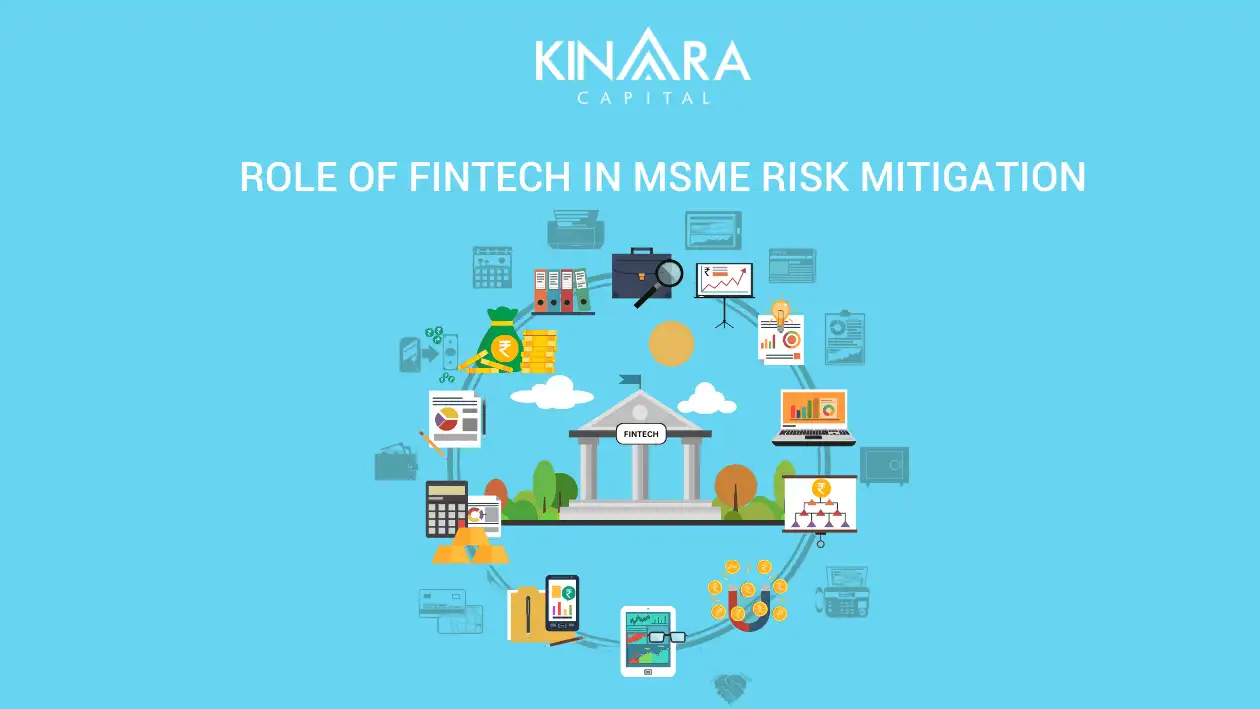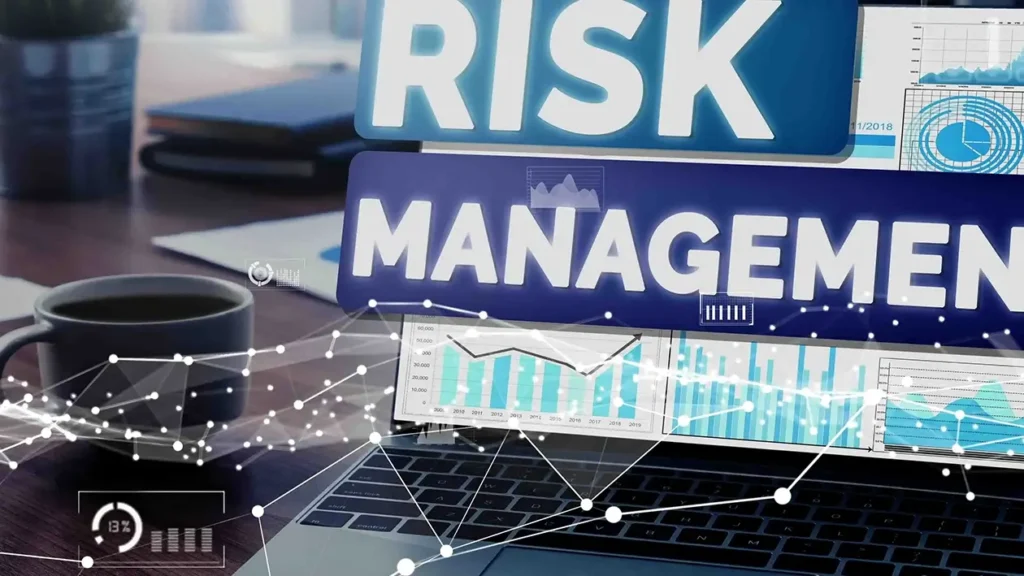
Micro Small and Medium Enterprises (MSMEs) are the backbone of the Indian economy, playing a pivotal role in driving economic growth and development. These enterprises form the foundation of various industries and contribute significantly to employment generation, export promotion, and fostering innovation. MSMEs account for a substantial share of industrial output and exports, making them crucial for the overall economic stability and inclusive growth in India. As a key driver of entrepreneurship and grassroots development, the success and growth of MSMEs are vital to achieving sustainable and equitable economic progress in the country.
In India, MSMEs confront various financial risks that impede their growth and sustainability. One significant obstacle is their limited access to formal financial services, including loans and credit facilities. Traditional lenders tend to perceive MSMEs as high-risk borrowers, leading to insufficient funds and higher interest rates, making it hard for these small businesses to meet their working capital needs and expand.
Another challenge for MSMEs lies in effectively managing credit risk. The absence of robust credit assessment mechanisms makes it difficult for them to access affordable credit options. Additionally, volatile market conditions and irregular cash flows further complicate matters, making it challenging for MSMEs to repay debts promptly. Consequently, they become susceptible to loan defaults and financial distress, which not only affects their own growth but also hampers the overall development of the MSME sector.
Fintechs have emerged as a game-changer in addressing the financial challenges faced by MSMEs. By leveraging new technologies like advanced data analytics, artificial intelligence (AI), and machine learning (ML) algorithms, some Fintech platforms offer innovative solutions for credit risk assessment, improving access to formal financial services for small businesses. These platforms provide alternative credit scoring models, which consider non-traditional data sources, enabling more accurate risk profiling and facilitating easier access to credit. Additionally, Fintechs also consider data security, fraud detection and prevention so that MSMEs’ data is secured and their details are leaked.
This blog explores the role of Fintech in mitigating risks faced by MSMEs and how these technological innovations are revolutionising the way small businesses manage uncertainties in their operations.
One of the primary challenges for MSMEs is access to formal financial services, such as loans, credit, and insurance. Traditional financial institutions often hesitate to extend credit to small businesses due to perceived risks and lack of collateral. Fintech platforms, on the other hand, leverage advanced data analytics and alternative sources of information to assess the creditworthiness of MSMEs. Some of the key barriers they face include:
Many MSMEs do not have an extensive credit history, making it difficult for traditional financial institutions to assess their creditworthiness. This lack of credit data often results in higher perceived risks, leading to reduced loan approvals or higher interest rates.
Traditional lenders often demand collateral as security for loans, which poses a significant challenge for MSMEs, as they may not have sufficient assets to pledge as collateral. This requirement further restricts their access to formal financing options.
The lengthy and cumbersome application processes of traditional financial institutions can be overwhelming for MSMEs, especially for those with limited resources and expertise in navigating these procedures.
Fintech platforms have revolutionised the way MSMEs access financial services, overcoming many of the challenges faced by traditional financing channels. Here’s how Fintech has bridged this gap:
Fintech platforms leverage innovative data analytics and technology to assess creditworthiness beyond traditional credit history. They analyse non-traditional data sources like digital transaction records, to create comprehensive credit profiles for MSMEs. This enables lenders to make more informed decisions and extend credit to small businesses that would have been overlooked by traditional lenders.
Fintech companies have introduced digital lending platforms that streamline the loan application process. These platforms have user-friendly interfaces, simplified documentation, and quicker approval times, making it easier for MSMEs to apply for loans and access funds promptly.
Some Fintech lenders offer collateral-free financing options, reducing the burden on MSMEs to provide physical assets as security. Instead, they rely on data-driven credit assessment to determine loan eligibility and terms.
Overall, the role of Fintech in addressing the challenges of accessing formal financial services empowers MSMEs to thrive, contributing to economic growth, job creation, and overall prosperity.
Fintech solutions have brought about a paradigm shift in credit risk assessment for MSMEs by leveraging non-traditional data sources and advanced analytics. Traditionally, banks and financial institutions relied heavily on credit scores, financial statements, and collateral to evaluate the creditworthiness of borrowers, including MSMEs. However, this approach often overlooked essential aspects of a business’s financial health, especially for small businesses that may have limited or no credit history.
The integration of non-traditional data sources into credit risk assessment is a game-changer for MSMEs. Fintech platforms harness various sources of data, such as supplier/customer relationships, to create a holistic view of a business’s financial behaviour. This data includes online reviews, customer feedback, and patterns in digital payments, shedding light on the business’s reputation, customer satisfaction, and cash flow patterns.
By analysing vast amounts of data with the help of sophisticated algorithms, some Fintech platforms generate comprehensive and accurate credit risk assessments for MSMEs. This data-driven approach allows lenders to assess the creditworthiness of MSMEs more objectively and make informed decisions about extending credit. As a result, even businesses with limited credit histories or no collateral can be evaluated based on their real-time financial performance and customer relationships.
The benefits of Fintech-enabled credit risk assessment are manifold. Firstly, it significantly reduces the chances of defaults, as lenders have a more accurate understanding of a borrower’s financial health and repayment capabilities. This reduces the overall credit risk in the MSME sector and improves the confidence of lenders in providing loans to small businesses. Consequently, more MSMEs gain access to formal credit, which can be crucial for their growth and expansion.
Furthermore, by enabling MSMEs to access formal credit at competitive terms, Fintech solutions promote financial inclusion. Previously underserved or marginalised businesses now have a fair chance to obtain financing and grow their operations, contributing to economic development and job creation.

Fraud poses a significant threat to the financial health and survival of MSMEs. Small businesses are often targeted by fraudsters due to their limited resources, lack of robust security measures, and sometimes inadequate awareness about potential risks. Fraudulent activities, such as payment fraud, identity theft, and cyberattacks, can lead to devastating financial losses for MSMEs. These losses can hinder their cash flow, disrupt operations, and damage their reputation, making it difficult for them to recover and grow. Thus, addressing fraud is of utmost importance for the stability and success of MSMEs.
Fintech tools equipped with artificial intelligence and machine learning algorithms offer powerful solutions for detecting and preventing fraudulent activities. Unlike traditional fraud detection methods, which may rely on predefined rules and patterns, Fintech platforms leverage AI and ML to continuously learn from vast amounts of data and adapt to emerging fraud trends. By monitoring financial transactions and user behaviour patterns in real time, these tools can identify suspicious activities promptly and accurately.
Real-time fraud detection is crucial for MSMEs as it enables them to take immediate action to prevent financial losses. When a suspicious transaction or activity is flagged, Fintech platforms can send alerts to the business owner, enabling them to investigate further and potentially block the transaction before any harm is done. Additionally, the continuous monitoring and adaptive nature of AI-powered fraud detection systems mean that they can quickly update their algorithms to detect new and evolving fraud schemes, staying one step ahead of fraudsters.
The implementation of robust fraud detection measures by Fintech platforms instils confidence in MSMEs when conducting digital transactions. As more small businesses embrace digital payment systems and e-commerce platforms, concerns about security and fraud prevention become paramount. By offering reliable fraud detection and prevention tools, Fintech companies build trust among MSMEs, encouraging them to utilise digital payment systems more frequently and explore the vast opportunities offered by the online marketplace. This, in turn, fosters growth and innovation within the MSME sector and contributes to the overall digitisation of the economy.
Supply chain disruptions and vendor-related risks can have a significant impact on the operations and financial health of MSMEs. For small businesses with limited resources and networks, such risks can be particularly challenging to mitigate effectively. However, Fintech solutions have emerged as valuable allies in addressing these supply chain challenges.
Fintech platforms offering advanced supply chain management tools enable MSMEs to monitor and assess the risks associated with their suppliers in real time. By leveraging data and analytics, these solutions provide businesses with valuable insights into their supply chain dynamics, supplier performance, and potential vulnerabilities. Such visibility empowers MSMEs to proactively identify and address risks, reducing the likelihood of costly disruptions to their operations.
One of the key advantages of Fintech-enabled supply chain management is the ability to anticipate potential disruptions. Real-time data and analytics allow MSMEs to stay informed about changing market conditions, geopolitical events, natural disasters, or other factors that may impact their suppliers’ ability to deliver goods and services. Armed with this information, businesses can take proactive measures to mitigate risks, such as finding alternative suppliers or adjusting production schedules.
Moreover, Fintech solutions enhance the decision-making process for sourcing strategies. With access to comprehensive data on supplier performance, delivery times, and quality standards, MSMEs can make more informed choices when selecting partners for their supply chain. Building stronger relationships with reliable suppliers not only reduces the risk of disruptions but also fosters a more collaborative and efficient supply chain ecosystem.
Overall, the adoption of Fintech-driven supply chain management tools enhances the resilience of MSMEs and bolsters their ability to navigate through challenging economic conditions. By effectively managing supply chain disruptions and vendor-related risks, small businesses can safeguard their operations, maintain customer satisfaction, and ultimately foster sustainable growth in a competitive marketplace.

Blockchain technology has the potential to revolutionise risk management practices for MSMEs, offering enhanced security, transparency, and efficiency in various aspects of their operations. Here’s how blockchain can be used to bolster risk management for small businesses:
Blockchain enables access to an immutable and transparent ledger, allowing MSMEs to track and trace every step of their supply chain. With a distributed ledger system, businesses can verify the origin, authenticity, and movement of goods throughout the supply chain. This transparency helps identify potential risks, such as counterfeit products, unauthorised alterations, or delays in delivery, enabling businesses to take proactive measures and mitigate these risks effectively.
Blockchain-based smart contracts are self-executing agreements with predefined conditions. They automatically trigger actions when specific conditions are met. MSMEs can utilise smart contracts to manage agreements with suppliers, customers, or partners, thereby reducing the risk of default or breach of contract. Smart contracts eliminate the need for intermediaries and ensure that parties adhere to their obligations, minimising the chances of financial loss due to contract-related risks.
MSMEs often deal with sensitive data, including customer information, financial records, and intellectual property. Blockchain’s decentralised nature and cryptographic security provide a robust framework for protecting data from unauthorised access and manipulation. By implementing blockchain-based data management systems, data security for MSMEs can be enhanced, and the risk of data breaches or cyberattacks can be reduced.
Blockchain’s immutability and consensus mechanism makes it highly resistant to fraud and tampering. MSMEs can leverage blockchain for identity verification and authentication processes. This reduces the risk of fraudulent transactions and ensures that only legitimate entities engage in business activities, safeguarding the business from financial losses and reputational damage.
Blockchain technology has paved the way for decentralised finance (DeFi) platforms that provide alternative financing options for MSMEs. Through blockchain-based lending and crowdfunding platforms, small businesses can access capital from a global pool of investors without the need for traditional intermediaries. This diversifies funding sources and reduces dependency on centralised financial institutions, mitigating the risk of credit crunches and limited access to credit during economic downturns.
Blockchain technology presents numerous opportunities for MSMEs to enhance their risk management practices. From securing supply chains and improving data management to preventing fraud and accessing decentralised financing, blockchain’s transformative potential empowers small businesses to build resilience, navigate uncertainties, and thrive in an increasingly competitive global marketplace. As the technology continues to evolve, MSMEs should embrace blockchain solutions to leverage its advantages for more effective risk mitigation and sustainable growth.
While the suggestion to embrace blockchain solutions for risk mitigation and sustainable growth in MSMEs has potential advantages, there are some drawbacks to consider:
Integrating blockchain technology can be complex and costly for MSMEs, especially for those with limited resources and technical expertise. The initial investment and ongoing maintenance could be significant barriers for smaller businesses.
The blockchain industry is still evolving, and there is a lack of standardisation in protocols and platforms. This can lead to compatibility issues when adopting blockchain solutions, making it difficult for MSMEs to choose the most suitable option.
Some blockchain networks currently face scalability issues, limiting the number of transactions they can process efficiently. This could be a concern for MSMEs with high transaction volumes or those aiming for rapid growth.
As blockchain is a relatively new technology, there may be regulatory uncertainties in some regions. MSMEs may face compliance challenges and potential legal issues while implementing blockchain solutions.
While blockchain is known for its security features, it is not entirely immune to vulnerabilities. MSMEs must ensure proper security measures to protect sensitive data and prevent potential breaches.
Fintech has revolutionised MSMEs by offering creative tools to tackle financial risks. These solutions, fueled by AI and data analytics, have transformed credit assessment, making it accurate and comprehensive. This boosts access to formal finance and decreases defaults, bolstering the MSME sector’s stability.
Fintech extends beyond credit risk, enhancing security with AI-powered fraud detection in digital payments. It also empowers MSMEs with supply chain tools for risk assessment and strengthens cash flow management, optimising financial processes.
To summarise, Fintech empowers MSMEs to flourish, contributing to the economy and job creation. Embracing evolving technology promises an even more resilient future for MSMEs and sustainable global economic growth.
One such leading Fintech in India, Kinara Capital aims to empower the MSME sector by providing them financial assistance via collateral-free business loans. Kinara provides different types of loan products like working capital loans and asset purchase loans (machinery loans) to small businesses for the expansion of their firm. Kinara also furnishes a specially designed program, HerVikas which provides a 1% discount on interest rates to encourage entrepreneurship in women.
To avail a business loan from Kinara, MSME owner can check their business loan eligibility in under 1-minute on their official website or in the myKinara application which is available to download from the Google Playstore. The application offers 7 vernacular language options to choose from, aiding easy navigation for the user. Once the eligibility criteria is cleared, the applicant needs to provide personal and business-related documents which will be verified by the fully secured digital portal, keeping all the user-safe and protected. Upon verification of the documents, the loan amount will be transferred to the applicant’s bank account within 24 hours.
Also, we have a dedicated customer support team available between Monday – Friday (9.30 AM – 6.00 PM) at our toll free number 1800-103-2683 for any questions or assistance. This ensures that entrepreneurs can get the help they need throughout the loan process.
